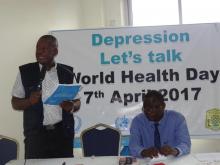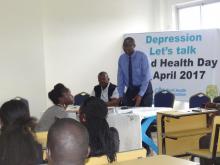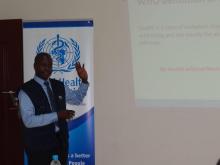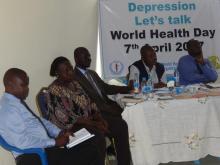South Sudan commemorates World Health Day 2017
Juba, 7 April 2017 - Under the theme “Depression. Let's talk”, South Sudan has joined the rest of the world to celebrate this year’s World Health Day in a series of activities which culminated with public lecture on depression, HIV/AIDS and Tuberculosis on 7th April, 2017 at Juba University.
The event was kicked off with delivering a bulk simple and short text messages (SMS) by telecom companies and followed by a series of TV and Radio talk shows to create awareness on the prevention and treatment of depression. Challenges in the context of the country and the best way for dealing with depression were discussed in different fora,
A public lecture at the University of Juba including discussions, question and answer session on the common causes of depression including HIV and Tuberculosis, symptoms and signs of depression, the best way of dealing with depression as well as messages on mental health in general marked the commemoration of the day. The event was attended by the general public, officials from the Ministry of Health, staff of the World Health Organization, Health professionals, students from the University of Juba and the media among others.
In his welcoming speech, Dr Pinyi Nyimol Mawien, the Director General for Preventive Health Services at the Ministry of Health, noted that, the theme of this year’s World Health Day, “Depression. Let's talk”, is an opportunity for all of us to get involved in activities that lead to better health. He also urged participants to learn the signs and symptoms of depression and know what to watch for in yourself and those around you.
The address of the WHO Regional Director for Africa, Dr Matshidiso Moeti was read by Mr Evans Liyosi on behalf of Dr Abdulmumini Usman, the WHO Representative to South Sudan. In the speech, Dr Moeti called on countries to support f mental health programmes by allocating adequate human and financial resources to respond to this growing burden, and appealed to Member States to include mental health in their national health development agenda.
The ongoing hardships and violence associated with the conflict in South Sudan, coupled with increased poverty, and a lack of basic services such as healthcare, education, water, sanitation, and housing not only aggravate mental distress and strain psychosocial well-being, but further constrain individuals from being economically and socially productive. To overcome the challenges, “we need to stay strong; know where to get support; learn how to relax, socially engage and let it out in order to be able to build the next generation” said Dr Atong Ayuel, Director, Mental Health Department, Ministry of Health.
The increased prevalence of mental disorders in combination with the limited health resources available in the country highlights the need for health service planning to minimize the gap between the increased demand and the provision of mental health and psychosocial support services.
Failure to address mental health and psychosocial disorders in populations that have experienced mass violence and trauma caused by conflict will impede efforts to enhance social capital, promote human development and reduce poverty. “The WHO is committed to support the Ministry of Health to improve the delivery of mental health services”, says Dr Usman. “The task requires continuing coordination and support of donors and partners by allocating adequate human and financial resources to respond to this growing burden.”
_____________________________________________________
For more information please contact :
Dr Joseph Lou Kenyi Mogga, +211 955 499 750, moggaj [at] who.int
Ms Jemila M. Ebrahim, +211 950 450 007, ebrahimj [at] who.int
Below:
01 On behalf of Dr Abdulmumini Usman, the WHO Representative to South Sudan, Mr Evans Liyosi reads the address of the WHO Regional Director for Africa, Dr Matshidiso Moeti
02 Dr Pinyi Nyimol Mawien, the Director General for Preventive Health Services at the Ministry of Health, addressing the participants of the event
03 Dr Joseph Mogga makes a presentation on the common causes of depression, symptoms and signs of depression, the best way of dealing with depression
04 The Panel from WHO, MoH and Juba University listening to audience questions







